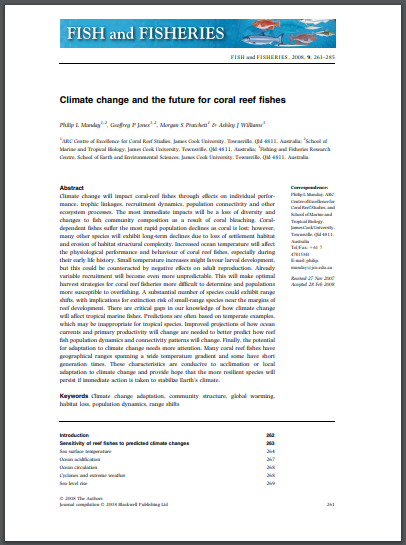
Climate change will impact coral-reef fishes through effects on individual performance, trophic linkages, recruitment dynamics, population connectivity and other ecosystem processes. The most immediate impacts will be a loss of diversity and changes to fish community composition as a result of coral bleaching. Coral-dependent fishes suffer the most rapid population declines as coral is lost; however, many other species will exhibit long-term declines due to loss of settlement habitat and erosion of habitat structural complexity. Increased ocean temperature will affect the physiological performance and behaviour of coral reef fishes, especially during their early life history. Small temperature increases might favour larval development, but this could be counteracted by negative effects on adult reproduction. Already variable recruitment will become even more unpredictable. This will make optimal harvest strategies for coral reef fisheries more difficult to determine and populations more susceptible to overfishing. A substantial number of species could exhibit range shifts, with implications for extinction risk of small-range species near the margins of reef development. There are critical gaps in our knowledge of how climate change will affect tropical marine fishes. Predictions are often based on temperate examples, which may be inappropriate for tropical species. Improved projections of how ocean currents and primary productivity will change are needed to better predict how reef fish population dynamics and connectivity patterns will change. Finally, the potential for adaptation to climate change needs more attention. Many coral reef fishes have geographical ranges spanning a wide temperature gradient and some have short generation times. These characteristics are conducive to acclimation or local adaptation to climate change and provide hope that the more resilient species will persist if immediate action is taken to stabilize Earth’s climate.














